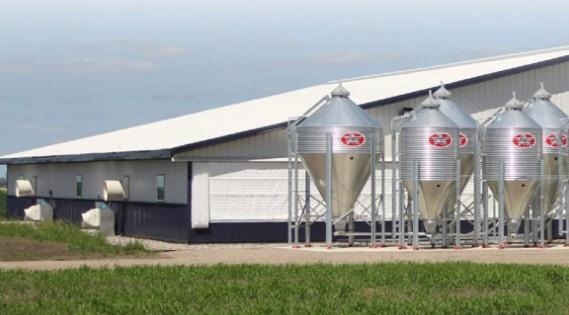Research at South Dakota State University
METHODS USED
In a trial at the South Dakota State University (SDSU) Commercial Wean-to-Finish Research Facility (Poudel et al., in press), 44 pens of mixed-sex weaned pigs were fed one of four diets across a phase-feeding program during the nursery period. The feed additives, consisting of a peptide-mix, MOS and protease, were included only in Phase 2 and Phase 3 diets in this study and were all products of the same company. A common Phase 1 diet was fed from days 1 to 7, Phase 2 treatment diets from days 8 to 21, Phase 3 treatment diets from days 22 to 35, and a common Phase 4 diet from days 36 to 49. Pens were assigned to receive: 1) Con: Standard corn-SBM-based diets with DDGS formulated to meet or exceed recommendations of NRC (2012) with no added peptide-mix, MOS or protease; 2) PepM: Con plus peptide-mix with MOS; 3) PepM_Pro: Con plus peptide-mix with MOS and protease; or 4) PepM_Pro(90): Con plus peptide-mix with MOS and protease with dietary amino acids provided at 90% of recommended levels according to NRC (2012). The peptide-mix and MOS blend was added to the diets at 0.3%. As in a previous study, bacterial composition was determined from fecal samples collected at the end of Phase 2 and Phase 3 from 10 randomly selected, but representative pigs based on performance at each timepoint. Specifically, fecal bacterial profiles at the end of Phase 2 and Phase 3 were compared from pigs in the Con, PepM and PepM_Pro treatment groups.

The South Dakota State University off-site wean-to-finish production barn.
FINDINGS
The average daily gain (ADG) of pigs fed the PepM_Pro diets between days 15 and 35 was greater compared to pigs fed the Con diets. No differences in average daily feed intake (ADFI) were noted throughout the trial period. Gain:feed was improved for pigs fed the PepM diets compared to pigs fed Con diets between days 15 to 35 and days 0 to 35. However, gain:feed was reduced when pigs previously fed PepM and PepM_Pro were fed the common Phase 4 diet compared to pigs fed Con diets.
Taxonomic profiling of fecal bacteria found that only two taxa, namely Streptococcaceae (Firmicutes) and Bacteroidaceae (Bacteroidetes), were lower in abundance from pigs fed Phase 3 Con diets compared to pigs fed Phase 3 PepM_Pro diets. There were no other differences between samples collected at the same time. Operational taxonomic unit (OTU) analysis identified differences for three individual bacterial species. Namely, compared to pigs fed Con diets:
- Pigs fed Phase 3 PepM_Pro diets had higher abundance of Ssd-00039 (predicted to be a strain of Streptococcus alactolyticus).
- Pigs fed Phase 2 PepM_Pro diets had lower abundance of Ssd-00928 (predicted to be a currently uncharacterized species of the genus Ruminococcus).
- Pigs fed Phase 3 PepM diets had lower abundance of Ssd-01079 (predicted to be a currently uncharacterized species of the Clostridia, an order affiliated to Firmicutes).
Conclusion
The combination of the feed additives peptide-mix, MOS and protease investigated in this study provided benefits to the performance of weaned pigs, and these feed additives modulated the swine gut microbiome. Furthermore, the most-abundant candidate bacterial species, Ssd-00039, identified in this investigation may provide further insight into the impact of changes to the swine gut environment on the health and growth performance of nursery pigs.
Source :